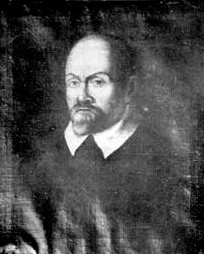| Profile | Major Works | Resources |
Giovanni Botero, 1543-1617.

Trained in a Jesuit seminary in Palermo, Botero left the order in 1580 and came into the service of Cardinal Carlo Borromeo of Milan. After the cardinal's death in 1584, Botero became the personal secretary of Cardinal Frederico Borromeo in Rome.
It was during his sojourn in Rome that Botero published his principal tracts. In his 1588 Greatness of Cities and his 1591-6 Relazioni universali, Botero promulgates the famous population doctrine later taken up by Robert Malthus: namely, that the means of subsistence (vitus nutritiva) interacting with the natural human fertility (vitus generativa) will determine the actual growth rate of population.
Botero's Reason of State (1589) expounded a "constitutionalist" view of government, against Machiavelli's scheme of personal power for power's sake. In this, Botero was closer to Jean Bodin. The power of the prince, Botero argues, relies ultimately on the power granted to him by the people and people's allegiance to a State is potentially far stronger than to an individual prince. Consequently, in the interest of his own preservation, the prince should do as much as possible to encourage "allegiance to the State" in the minds of the people. This means things like enshrining consultation, representation, religion, etc. in the legal and political institutions of the state, so as to create what we might call today a "stakeholder" society. Simultaneously, this means keeping personal interventions and "great works" to a minimum. Consequently, Christian ethics and other codes of social behavior should not be dismissed as irrelevant encumbrances on the personal rule of the prince, but rather, by being enshrined in the institutions of the State, they can be the most potent source of power for the prince. In short, limiting personal power and exhibiting ethical behavior ultimately pays off by making the interests of the people coincident with the preservation of the State -- and thus the preservation of the sovereign.
In 1599, Botero was appointed a political consultant and tutor in the court of the Duke of Savoy. Outside of a brief campaign in Spain, Botero would remain in Turin for the remainder of his life.
|
Major Works of Giovanni Botero
|
|
HET
|
|
Resources on Giovanni Botero
|
All rights reserved, Gonšalo L. Fonseca
